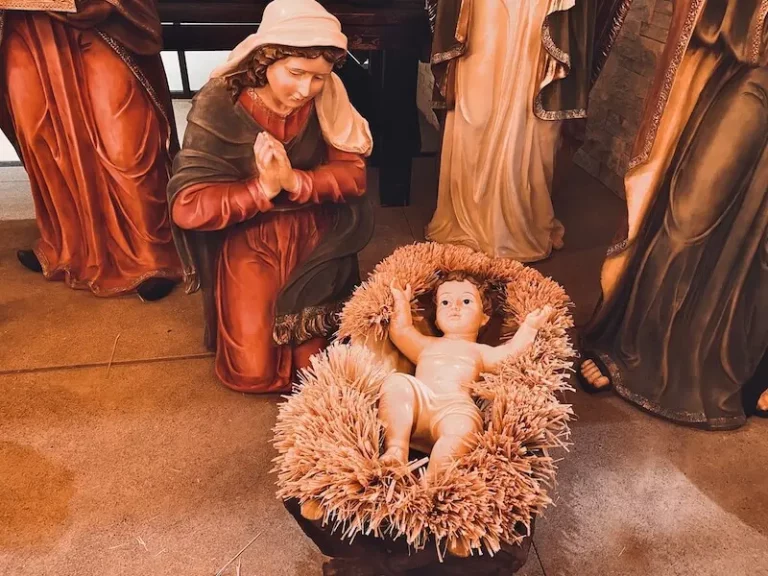The Two Parts of Christmas Celebrations
For unto you is born this day in the city of David a Saviour, which is Christ the Lord (Lk. 2:11 KJV)

Similar to the Old Testament feasts, Christmas has two significant parts as a spiritual celebration: the meaning and the festivities of the celebration.
If Christmas is a house, then the spiritual meaning is the foundation, while the festivities are the building erected upon that foundation. So, just as a complete home requires both the invisible foundation and the external structure, Christmas is a package of meaning and joyous celebration. As noted in a previous devotional, the Lord delights in having His people in festive celebrations.
The foundation of Christmas is the spiritual meaning of Christmas. We remember and consider the birth of the Savior of the world. Christmas is Jesus’ birthday; it takes on its whole spiritual meaning as we recognize, rejoice and give thanks that our Savior was born to save us from our sins.
The spiritual meaning as the foundation of Christmas supports the visible form of the joyous celebrations. Anyone could share these festivities, whether they are Christians are not. However, since the world cannot accept and celebrate Jesus as the Savior and Lord, they cannot truly celebrate Christmas. They would have to resort to other means of accepting the joyful activities while rejecting the connection with the birth of the Savior.
Therefore as you celebrate Jesus’ birth, remember that it is His birthday. And birthdays, just as spiritual feasts mentioned above, always combine meaning and festivities!
Reading Through the Bible Conference recordings now available.
Download your FREE guide to read the Bible in 2022 and View Conference recordings!
Have you ever attended a birthday party that was solely a remembrance of an added year without the joy of celebrations?
We should neither make Jesus’ birthday boring nor empty— we should not ruin the party! Give it weight as you put Jesus’s birth at the center of the celebration; make it exciting with the joy and presents, and by putting a smile on someone’s face. You can be sure He takes delight in His people celebrating Him!
Thank Jesus for accepting to come as a human being to save us.
Sanctify yourselves therefore, and be ye holy: for I am the Lord your God. And ye shall keep my statutes, and do them: I am the Lord which sanctify you. (Leviticus 20:7–8, KJV)

As the Great I AM that I AM, God revealed Himself as the Lord who sanctifies His people in the Old Covenant—Jehovah Mekaddishkem. But this was only a shadow of something greater that was coming in the New Testament.
Jehovah Mekaddishkem is the English transliteration of the Hebrew words for “I am the Lord which sanctify you” ( “mekaddish” = sanctify, “kem” = you). Divine names and titles in the Old Testament often reveal an aspect of God in relation to His people.
There are three keywords that underlie the meaning of sanctification: “wash,” “consecrate,” and “separate.” Sanctification essentially means to make something holy. Sinlessness is a core aspect of holiness, but there is more to holiness than sinlessness. It is the very nature of God. However, when used in reference to us humans, it means to be cleaned from sin, set apart for God, and consecrated to Him.
In the passage above, God tells the people first to sanctify themselves and then reveals He is the One who sanctifies them. Thus, He gives us the two sides of sanctification—the God side and the human side. There’s something God does and something His people do for their sanctification.
This truth was only a shadow in the Old Testament. It is in Christ that we see God fully revealed as Jehovah Mekaddishkem to His people through the sanctifying work on the cross. In speaking to the Corinthians, Paul revealed,
“And such were some of you: but ye are washed, but ye are sanctified, but ye are justified in the name of the Lord Jesus, and by the Spirit of our God.” (1 Corinthians 6:11, KJV)
This is Jehovah Mekaddishkem fulfilled in Christ: We were washed and sanctified. Note that these are in past tense, describing something God has already done. The day you received Christ, you received the bath of your life, a heavenly bath by the Spirit of God that removed every stain of sin through the precious blood of Christ. And as you continue to live on earth, the Spirit continues to sanctify you daily.
Following the sanctifying work He has already done in us, He commands us,
“For this is the will of God, even your sanctification, that ye should abstain from fornication:” (1 Thessalonians 4:3, KJV)
Now that you are clean, washed, and sanctified, He tells us to put that sanctification to work outwardly. Paul explicit states it is what God wants—His will. He gives us a very specific example of sanctification here: abstain from sexual immorality. Few things defile us, like sexual impurity. But sanctification certainly includes more than abstaining from fornication or adultery. As above, it includes living a consecrated and separated life to God daily in the way we talk, act, think, feel, and handle our bodies.
He is Jehovah Mekaddishkem, the God who has Sanctified you in Christ and continues to sanctify you every day.
Meditate
Is our sanctification completed, ongoing, or both?
Apply the Word
This is the crucial part of this devotional. Until you receive the truth that God has already sanctified you by His Spirit, you will not be empowered to be sanctified practically. Put God’s sanctification power to work in your life daily by faith in the finished work of Christ.
Pray
Ask the Lord to help you in your daily walk of sanctification.
Free Mini E-book: From Spiritual Dryness to Flourishing








